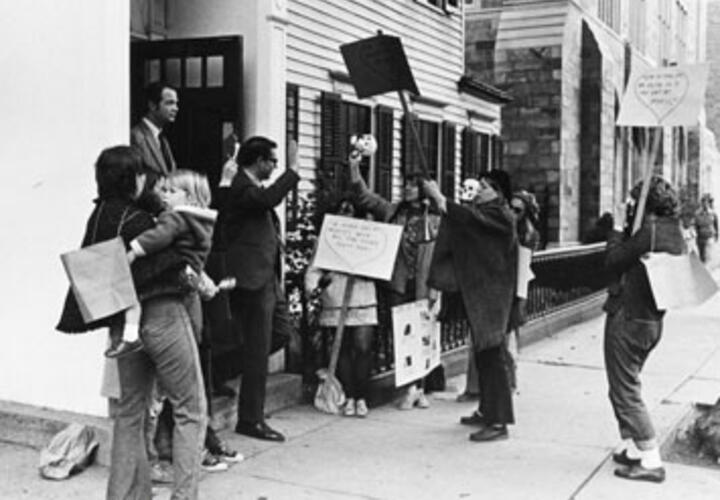EGC Quarterly Newsletter, September 2020

Enabling Inclusion: Women in economics, and economics in women’s lives
This newsletter reaches you at a time when lives at Yale and around the world are jostled by strong and conflicting forces.
Students and faculty look to find ways to collaborate remotely, the Covid-19 pandemic affects every aspect of daily life, and we are remembering how Ruth Bader Ginsberg worked toward an inclusive society.

Heidi Hartmann (second from right) and members of New Haven Women’s Liberation demonstrate outside Mory's Restaurant, which barred women's entry, in 1969.
At EGC, gender and an inclusive response to Covid-19 is at the front of our minds – especially as Yale holds a four-day symposium marking the end of its yearlong celebration commemorating the admission of women students. On Friday, Yale alumni Janet Yellen and Katherine Baicker will discuss inequality in America today. Meanwhile, EGC affiliates continue to research policy responses to Covid-19 to prevent the further marginalization of women and other vulnerable populations in developing countries. And as a community, we have been documenting how fostering inclusion benefits society and, more specifically, the field of economics.
A striking example of the benefits of inclusion comes from the career of Cynthia Taft Morris (Yale PhD 1959):
“I had not arrived at Yale seeking a Ph.D., but I guess the ambiance shifted my ambitions back to academia. When I passed my comprehensives at Yale in 1955, I seemed at first to have no options since Yale did not permit women to corrupt their young men by teaching them…. Finally, with two glasses of sherry under my belt, I telephoned Arthur Smithies, Chair of the economics department at Harvard, and persuaded him to hire me as a teaching fellow…. In the end I taught introductory economics in Lamont Library, the only place with easy access for someone on crutches. I wasn't allowed to teach women because the deed of the building forbade it.” – Cynthia Taft Morris, Cliometric Society Interview
Taft Morris was one of Yale’s first female PhDs in development economics and, together with Irma Adelman, made pioneering contributions in economic development and economic history. To do so, she broke through many barriers facing women and individuals with disabilities. (Taft Morris had waist-down paralysis from polio at the age of 13.)
On the EGC website, you can read Taft Morris’s story, along with examples of other women who overcame systematic bias to make brilliant contributions to Yale, economics, and an inclusive society. On Saturday, Sept. 26, we are hosting a virtual event to celebrate these women, and will discuss ways to make economics more open to women. Click here to register.
Our understanding of how gender functions in the economy has advanced greatly due to the contributions of the women we will speak with on Saturday – and innumerable researchers. At EGC, several faculty and graduate students are pursuing important research agendas on gender and development. To highlight three recent contributions:
- In the August 2020 Presidential lecture at the Econometric Society World Congress, Orazio Attanasio spoke on ‘Econometrics as Measurement: new measures to model decision-making’ and highlighted how theory and innovative measurement techniques can help us identify gender imbalances in household power structures.
- Our PhD student, Martin Mattson, has documented how the Me Too movement increased sex crime reporting across countries.
- Penny Goldberg and coauthors document the persistence of legal forms of gender discrimination in countries around the world.
Today, Covid-19 threatens progress on gender equality along many dimensions in developing economies – for instance, Mushfiq Mobarak’s work in Sierra Leone documents increased food insecurity for female headed households. EGC-MacMillan work in India is looking to understand how the response to the Covid-19 pandemic affects poor women and, importantly, how policy can respond to conservative gender norms which slow women’s ability to recover from the pandemic.
Today, more than ever, policies to enable inclusion depend on citizen support for them. And sometimes, at an election, democratic institutions themselves are in play. It’s vital we vote to keep them.

Rohini Pande
Henry J. Heinz II Professor of Economics
Director, Economic Growth Center
Publications

Donovan et al. on the effects of footbridge construction on market access in Nicaragua; Peters on markups and firm growth using data from Indonesia; Pande on democracy in developing countries. Explore recent journal articles on EGC’s publications page.
EGC in the News

Goldberg on poverty reduction in a post-globalized world; Espín Sánchez discusses university investment in fossil fuels with CNN en Español; EGC researchers and Google create smart flood alerts in India and Bangladesh. Read recent op-eds and stories on EGC’s news page.
Jobs

EGC is hiring! We are seeking a Senior Administrative Assistant to work with EGC faculty and serve as a principal resource to current and prospective International and Development Economics (IDE) students.